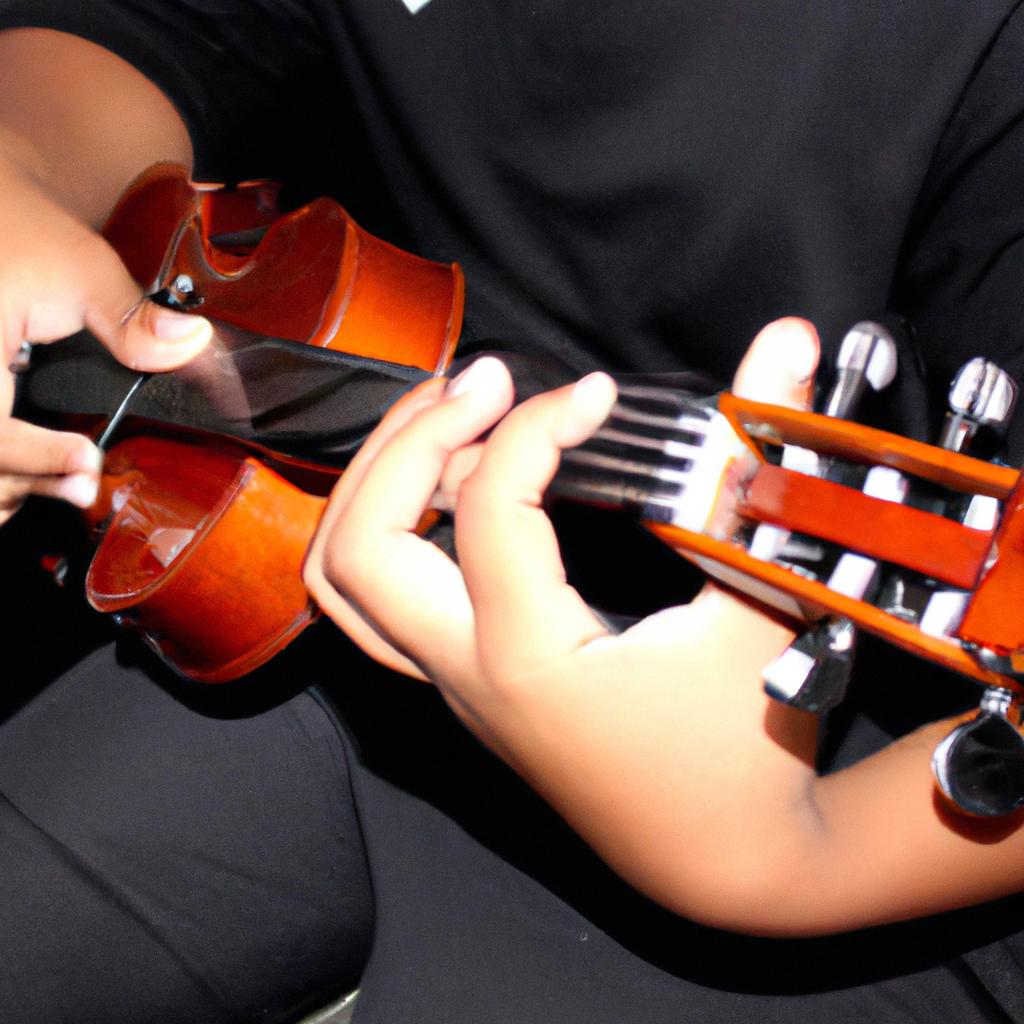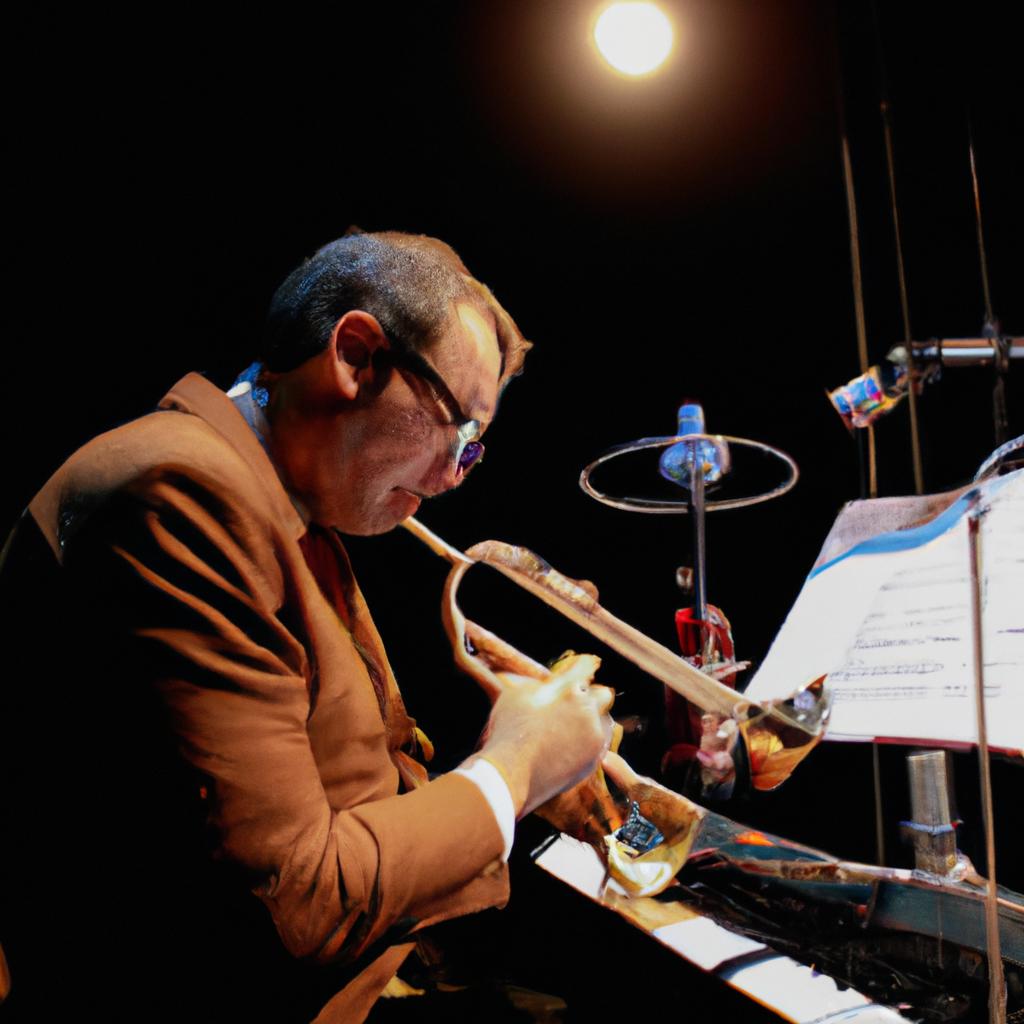In the realm of music, beginners often find themselves faced with a myriad of challenges as they embark on their journey to develop their skills. Whether it be learning an instrument or refining vocal techniques, mastering the art of music requires dedication and perseverance. For instance, imagine a young aspiring guitarist named Alex who has just picked up his first guitar. He is eager to learn and improve his playing abilities but finds himself overwhelmed by the vast amount of information available online and unsure where to start. This article aims to provide a comprehensive guide for beginner level musicians like Alex, offering valuable insights and practical tips on how to navigate through this initial phase of musical development.
Developing one’s skills in music encompasses various aspects that go beyond simply acquiring technical proficiency on an instrument or memorizing sheet music. It involves building a strong foundation in music theory, honing listening skills, understanding different genres and styles, as well as cultivating creativity and expression within one’s own musical endeavors. Furthermore, it also entails developing effective practice habits and setting realistic goals to ensure steady progress over time. The journey towards becoming a proficient musician may seem daunting at first; however, armed with knowledge and guidance, individuals can embark on this transformative process with confidence and enthusiasm. This article strives to serve as an academic This article strives to serve as an academic companion, providing beginners like Alex with a roadmap to navigate the realm of music. It aims to demystify complex musical concepts and techniques, offering clear explanations and step-by-step guidance. By breaking down the learning process into manageable segments, this guide seeks to empower individuals with the necessary tools and resources to progress at their own pace.
To begin, it is essential for beginners to establish a solid foundation in music theory. Understanding key concepts such as notation, rhythm, scales, chords, and harmony lays the groundwork for further exploration and growth. This article will provide concise explanations of these topics and offer practical exercises that reinforce comprehension.
In addition to theoretical knowledge, developing listening skills is crucial for musicians of all levels. Active listening allows individuals to analyze and appreciate different musical elements such as melody, harmony, rhythm, dynamics, and timbre. By studying various genres and styles across different time periods, beginners can expand their musical vocabulary and gain insights into the creative possibilities within their chosen instrument or voice.
Furthermore, this guide emphasizes the importance of creativity and expression in music. It encourages beginners like Alex to explore improvisation and composition as means of personal artistic development. By nurturing their unique musical voices and experimenting with different ideas, individuals can add depth and authenticity to their performances.
Effective practice habits are also addressed in this article. It provides strategies on how to structure practice sessions for maximum efficiency and productivity. From setting specific goals to utilizing techniques like repetition, slow practice, and focused concentration, beginners can optimize their practice time while avoiding common pitfalls that hinder progress.
Lastly, this guide acknowledges that every musician’s journey is unique. It encourages learners to embrace mistakes as opportunities for growth rather than sources of discouragement. With patience, dedication, and a positive mindset, anyone can embark on a fulfilling musical journey filled with joyous discoveries.
Overall, this comprehensive guide aims to be a trusted companion for beginner musicians like Alex. By providing valuable insights, practical tips, and a wealth of resources, it seeks to empower individuals with the knowledge and skills necessary for their musical development. Whether it be mastering an instrument or refining vocal techniques, this article aims to support beginners in their quest for musical excellence.
Setting Goals
Setting Goals
To become a successful musician, it is crucial to set clear and achievable goals. By establishing objectives for your music journey, you not only provide yourself with direction but also increase motivation and focus. For instance, let’s consider the hypothetical case of John, an aspiring guitarist who dreams of playing in a band someday. Without setting specific goals, John may find himself struggling to make progress or losing sight of his ultimate vision.
In order to effectively set goals as a beginner musician, there are several key steps to follow:
-
Identify your musical interests: Reflect on what genres or styles of music resonate with you the most. This will help guide your goal-setting process by allowing you to prioritize areas that align with your interests.
-
Break down long-term goals into short-term milestones: Long-term aspirations can often seem overwhelming when approached all at once. To avoid becoming discouraged, break them down into smaller, more manageable tasks or milestones. These shorter-term objectives act as stepping stones towards achieving larger ambitions.
-
Make your goals SMART: Utilize the SMART framework (Specific, Measurable, Achievable, Relevant, Time-bound) when formulating your musical goals. Ensure they are specific enough so that progress can be easily tracked and measured along the way.
-
Hold yourself accountable: Establishing accountability measures can significantly enhance goal achievement rates. Consider sharing your intentions with friends or family members who can offer support and encouragement throughout your musical journey.
Creating goals provides structure and purpose within one’s practice routine; however, it is essential to approach this process with care and consideration for personal circumstances and limitations.
| Goals Bullet Points |
|---|
| – Enhance technical proficiency on chosen instrument(s). |
| – Expand repertoire by learning songs from various genres/styles. |
| – Improve improvisation skills through regular practice sessions. |
| – Collaborate with other musicians through jamming or joining a band. |
When setting goals, keep in mind that they should be tailored to your individual needs and aspirations. By following these steps and incorporating the SMART framework into your goal-setting process, you can effectively chart a path towards musical growth and development.
Moving forward, let’s explore the next section on “Choosing an Instrument” as we delve deeper into finding the perfect fit for your musical journey.
Choosing an Instrument
Transitioning from the importance of setting goals, let’s now explore how to develop an effective practice routine. Imagine a beginner musician named Alex who is eager to learn guitar. By implementing a well-structured practice routine, Alex can maximize their learning potential and make steady progress on their musical journey.
To begin with, here are some key elements to consider when developing a practice routine:
- Consistency: Regular practice sessions are essential for skill development. Aim for consistency by scheduling specific times each day or week to dedicate solely to practicing your instrument.
- Time management: Efficiently managing your time during practice can lead to more productive sessions. Break down your practice into manageable segments focusing on different areas such as scales, chords, technique exercises, and repertoire.
- Variety in exercises: Incorporating various types of exercises helps maintain engagement and prevent monotony in your practice routine. Include warm-up drills, sight-reading challenges, improvisation exercises, and playing along with recordings or backing tracks.
- Goal-oriented approach: Set short-term and long-term goals that align with your overall aspirations as a musician. Breaking larger goals into smaller milestones will help you stay motivated and track your progress effectively.
Consider this emotional impact of having a structured practice routine:
- Enhanced focus and discipline
- Increased motivation and self-confidence
- Improved time management skills
- Steady progress towards achieving musical goals
Incorporating these aspects will ensure that you get the most out of each practice session while maintaining enthusiasm throughout your musical journey.
Moving forward without interruption, let’s delve into the significance of understanding music theory as it plays a vital role in becoming a proficient musician
Understanding Music Theory
Transitioning from understanding music theory, it is crucial for beginner musicians to focus on developing proper technique. Let’s consider the case of Sarah, a novice violinist who initially started learning without paying attention to her hand and finger positioning. As a result, she struggled with playing in tune and experienced discomfort during practice sessions.
To avoid similar pitfalls, here are key factors to keep in mind when working towards developing proper technique:
-
Posture:
- Maintain an upright posture while seated or standing.
- Position your instrument comfortably against your body.
-
Hand Placement:
- Ensure correct hand placement by aligning your fingers with the strings or keys.
- Keep your wrists relaxed but firm.
-
Finger Dexterity:
- Practice finger exercises to improve dexterity and precision.
- Gradually increase speed and accuracy over time.
-
Bow Control (for string instruments):
- Hold the bow correctly using all four fingers.
- Experiment with different bow pressure and angles to produce varied tones.
By implementing these techniques consistently, beginners like Sarah can minimize physical strain and create a solid foundation for further growth as musicians.
In addition to practicing proper technique, it is important to maintain motivation throughout the learning process. Consider the following emotional benefits that come with mastering an instrument:
| Emotional Benefits |
|---|
| Boosts confidence |
| Enhances self-expression |
| Provides stress relief |
| Fosters a sense of accomplishment |
Remember that progress may not always be linear, but perseverance will yield results over time.
With a strong foundation in place through proper technique development, we can now move on to exploring efficient ways of practicing our chosen instrument
Practicing Efficiently
Transitioning from understanding music theory, the next crucial aspect of becoming a well-rounded musician is developing your ear training. Imagine this scenario: you are sitting in on a jazz jam session and one of the musicians starts playing an unfamiliar chord progression. Without strong ear training skills, you may struggle to identify the chords being played or improvise over them effectively. However, with proper ear training, you can easily recognize and understand the harmonic structures, enabling you to join in seamlessly.
To enhance your ear training abilities, consider incorporating these strategies into your practice routine:
- Active Listening: Actively listen to various genres of music and pay close attention to different elements such as melodies, harmonies, rhythms, and dynamics. This active engagement will help train your ears to distinguish between different musical components.
- Solfege Exercises: Utilize solfege syllables (do-re-mi) to sing intervals and melodies. Practice identifying and reproducing different pitches accurately using solfege notation.
- Interval Recognition: Focus on recognizing intervals by listening to examples or utilizing interval recognition apps or websites. Train yourself to associate specific sounds with their corresponding distances within the musical scale.
- Transcription Challenges: Challenge yourself by transcribing melodies, chord progressions, or even entire songs by ear. Start with simpler tunes and gradually work towards more complex compositions.
By incorporating these strategies into your regular practice routine, you can develop your ear training skills progressively over time. Remember that consistency and dedication are key when it comes to honing your musical abilities.
| Strategy | Description | Benefits |
|---|---|---|
| Active Listening | Actively engage with various genres of music | Enhanced ability to differentiate musical components |
| Solfege Exercises | Singing intervals and melodies using solfege syllables | Improved pitch accuracy |
| Interval Recognition | Recognizing the distance between two pitches within a musical scale | Increased ability to identify and reproduce different intervals |
| Transcription Challenges | Transcribing melodies, chord progressions, or songs by ear | Improved overall listening skills and understanding of musical structure |
As you continue your journey as a beginner level musician, developing strong ear training will not only enhance your musical perception but also boost your improvisational skills. In the upcoming section about “Developing Ear Training,” we will explore various exercises and techniques that can further refine your ear training abilities, allowing you to navigate complex musical landscapes with confidence. So let’s dive in!
Developing Ear Training
Building on the importance of efficient practice, developing ear training is another crucial aspect for beginner musicians. By honing your ability to recognize and reproduce musical sounds accurately, you can enhance your overall musicality and become a more well-rounded musician. Imagine this scenario: You are playing with a band, and suddenly one of the members starts improvising in a different key. With developed ear training skills, you would be able to quickly identify the new key and adjust your playing accordingly, seamlessly adapting to the changes.
Paragraph 1:
To develop your ear training skills effectively, consider incorporating the following strategies into your practice routine:
- Singing exercises: Engage in vocal warm-ups that focus on interval recognition and pitch accuracy. This will help train your ears to identify specific intervals between notes and improve your ability to match pitches.
- Transcribing music: Choose songs or solos that resonate with you and transcribe them by ear. Use tools like slow-down software if needed, but aim to rely on your own listening abilities as much as possible. This process will not only deepen your understanding of how melodies are constructed but also strengthen your ability to hear intricate details within music.
- Interval identification drills: Practice identifying common intervals (e.g., major third, perfect fifth) through various exercises such as listening to random sequences of two notes and discerning their distance from each other.
- Chord progressions analysis: Listen attentively to songs or pieces of music and try to identify the underlying chord progressions. This exercise will help you train your ears to recognize familiar patterns commonly used in music compositions.
Paragraph 2:
Incorporating these strategies into your regular practice sessions will gradually refine your ability to perceive pitch differences, distinguish harmonies, and internalize musical structures. To further illustrate the significance of developing ear training skills for beginner musicians, let’s take a look at the emotional impact it can have on both the performer and the audience.
| Emotion | Performer | Audience |
|---|---|---|
| Connection | Feel a deeper connection with the music being played, allowing for more expressive performances. | Experience a stronger emotional connection to the music, making it more engaging and memorable. |
| Confidence | Develop confidence in playing by relying on your ears rather than solely reading sheet music or tabs. | Gain trust in the musician’s abilities leading to a heightened sense of enjoyment during live performances. |
| Creativity | Enhance creative expression by improvising melodies and harmonies that complement existing musical ideas. | Appreciate innovative musical choices, sparking inspiration and admiration for the artist’s creativity. |
| Musicality | Cultivate a unique musical identity through personalized interpretations of songs or compositions. | Enjoy heightened musicality from experiencing nuanced dynamics, phrasing, and tonal variations in performances. |
Paragraph 3:
With consistent practice and patience, developing ear training skills will gradually become second nature to you as a beginner musician. This newfound ability will not only empower your individual musicianship but also allow you to collaborate seamlessly with other musicians, creating harmonious experiences together.
As you continue your journey as a beginner musician seeking guidance, let us explore some effective ways to find mentors who can provide valuable insights and support throughout your development without stepping into another “step”.
Seeking Guidance
Developing your ear training is a crucial step in becoming a skilled musician. Once you have honed this skill, seeking guidance from experienced musicians and professionals can greatly enhance your musical journey. By learning from those who have already walked the path of mastery, you can gain valuable insights, receive constructive feedback, and accelerate your progress as a beginner level musician.
Seeking guidance allows you to tap into a wealth of knowledge and experience that others possess. Let’s consider an example to illustrate its importance. Imagine you are struggling with improvisation on the guitar. Despite hours spent practicing scales and techniques, you find it challenging to create melodic phrases that flow seamlessly. Seeking guidance from a seasoned guitarist who specializes in jazz could provide invaluable advice on chord progressions, phrasing techniques, and how to effectively use scales within improvisation. This mentorship will deepen your understanding of the genre while providing specific strategies tailored to your needs.
When seeking guidance as a beginner level musician, keep these key points in mind:
- Find mentors or teachers specializing in your desired genre: Look for individuals who have expertise in the style of music you want to master. Their insight will help shape your skills more effectively.
- Attend workshops and masterclasses: Participating in workshops led by established musicians provides opportunities for hands-on learning experiences and exposure to different perspectives.
- Join online communities: Engaging with like-minded musicians through forums or social media groups creates networking opportunities and fosters collaboration.
- Seek honest feedback: Constructive criticism is essential for growth. Embrace feedback from trusted sources who can identify areas where improvement is needed.
To further emphasize the importance of seeking guidance as a beginner level musician, let’s take a look at the following table showcasing notable musicians’ stories:
| Musician | Genre | Mentor/Musical Influence |
|---|---|---|
| Jimi Hendrix | Rock/Blues | B.B. King |
| Yo-Yo Ma | Classical | Leonard Bernstein |
| Alicia Keys | R&B/Soul | Prince |
| Carlos Santana | Latin/Rock | Tito Puente |
The above table demonstrates how these renowned musicians sought guidance from established figures in their respective genres, leading to their own artistic growth and success.
In summary, seeking guidance is an essential part of your journey as a beginner level musician. By learning from experienced mentors or teachers, attending workshops, joining online communities, and embracing honest feedback, you can accelerate your progress and gain valuable insights. Remember that seeking guidance not only enhances your technical skills but also broadens your musical horizons by exposing you to different perspectives and influences. Embrace this opportunity for growth and watch yourself flourish as a musician.
 Mikey Dee
Mikey Dee



